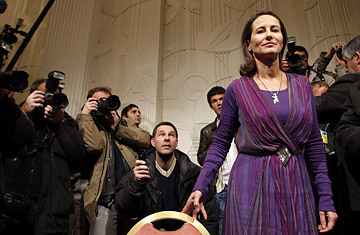
Ségolène Royal
French Socialist Ségolène Royal scored high enough marks as a presidential candidate in 2007 to finish second in the race, with 17 million votes. These days, her grades — and her ability to get on with her political colleagues — have slipped. In a new book set for publication Feb. 5, Royal not only belittles her victorious rival, President Nicolas Sarkozy, as a greedy, vain, amoral "little boy happy to be surrounded by his toys," she also takes swipes with similar venom at fellow Socialist Party heavyweights. Oddly enough, Royal appears to hope that the book's belligerent and paranoid-sounding attacks on friends and foes alike will boost her popularity ahead of another anticipated run at the Elysée in 2012.
The collection of interviews, titled Femme Debout (Standing Woman), is expected to fly off bookshelves when it hits stores Thursday. As the title suggests, the book seeks to dispel any suspicion that a series of setbacks Royal has suffered since her May 2007 loss to Sarkozy has weakened in any way her bid for another run in 2012. In addition to the jabs at those she feels are conspiring to block her path, Royal also punctuates the book's pages with the boundless self-confidence that has proven both an asset and a liability to her over time. (See pictures of Bastille Day celebrations.)
"If there's a better [candidate] than me, I'll even campaign for him in 2012," Royal says in one of the many challenges laid down in the 40 hours of interviews the book boils down. "But for the moment — sorry — I don't see him."
What Royal does see is a Socialist Party whose leading lights — the so-called elephants — are either macho males who secretly view politics as a men-only club or complicit women who do their men's bidding. "Their thinking is basic: I'm male, I'm on the right career path, been to the right schools, have all the abilities, and I'm just the man for the job," Royal says of the party's male leadership that includes Dominique Strauss-Kahn, Paris mayor Bertrand Delanoë and former Prime Minister Laurent Fabius. "It's a very patrimonial and possessive conception of politics, like the capitalism practiced by heirs."
Royal is also harsh with Martine Aubry, the former Labor Minister under whom Royal served as Secretary of State in the late 1990s. Aubry narrowly beat Royal for the party leadership last November. "Despite the primary, the presidential election and a more than honorable score, I'm still her junior minister, and [Aubry] will never see me otherwise," Royal contends, adding that her rival also served as a proxy for male Socialist elephants to deny Royal the party leadership. "They found a woman to battle another woman on the logic we'd beat each other bloody, and they could step in and take over in 2012."
Through personal swipes and broad generalities, Royal paints a picture of a dysfunctional and self-defeating Socialist Party constantly torn apart by individual ambition. But critics say Royal is part and parcel of the very thing she criticizes. Moreover, in blaming fellow Socialists, the media and Sarkozy's allies for conspiring to deny her, Royal frequently comes off sounding alternately self-aggrandizing and paranoid. "This book is bizarre, because it shows Royal shedding the profile and language of traditional politicians without her assuming any other persona beyond someone demanding attention from the public and media," says Dominique Reynié, director of the Foundation for Political Development, a Paris-based think tank. "It's not constructive, and it really isn't even logical."
Piqued by criticism that her career is more hype than substance, Royal says her detractors "are all contemptuous of me" before boasting "I'm so far ahead of them all." And responding to derision that her infamous September 2008 rally was a mix of infomercial, stand-up comedy and political televangelism, Royal upped the ante. "You have to be a moron to scream about sacrilege, about cultish [behavior] when everyone is in ecstasy over [Barack] Obama's campaign," she says in the book, echoing her contention when Obama was sworn in last month that the new U.S. President had "copied" her campaign and "even used slogans similar to mine."
Shrill? Maybe — though it's nothing compared to the lashing Royal gives Sarkozy, whom she variously describes as vulgar, avaricious and (gasp) boringly predictable. "His energy is impressive, but he really is a show-off," Royal says, claiming Sarkozy's quest for money and power leaves him looking ridiculous once he's attained it. "With his little sheriff's star and his plastic gun, his cowboy outfit, it's as if he had climbed up on the biggest horse in the merry-go-round and plucked down the prize."
Maybe, but unlike Royal, Sarkozy (and copycat Obama) won their presidential bids and don't spend their time plotting revenge. "The real problem with this book is, it will horrify Sarkozy backers, thrill her own — and lead most in the middle asking what Royal could have been thinking when she wrote it," Reynié says. "If further dividing the left and uniting the right around Sarkozy is Royal's strategy for beating him, it certainly is unconventional."
